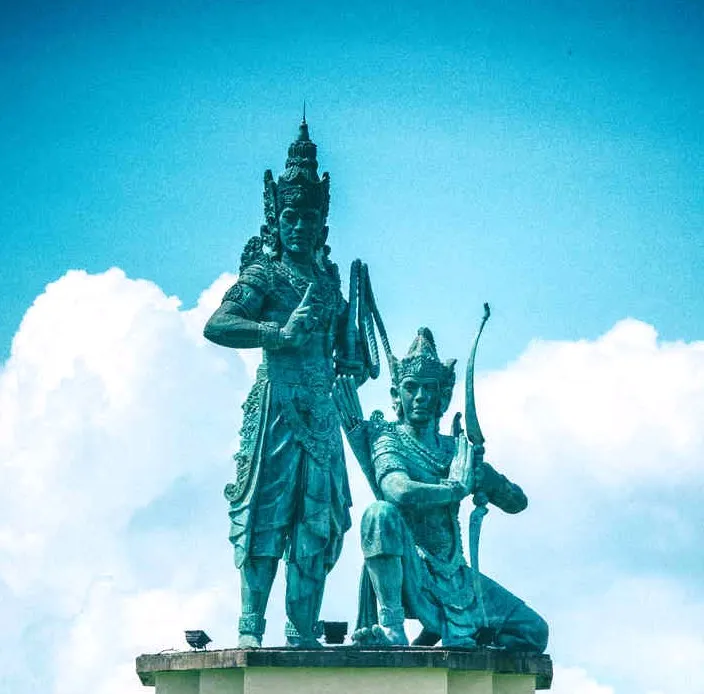
Meditation on "The Archer"

"The Archer" is a song of self-doubt, longing, and existential fragility. Our Lady sings here from a place of deep vulnerability, questioning her identity, relationships, and the way others perceive her. The refrain, "Who could ever leave me, darling? But who could stay?", captures the essence of impermanence: nothing is fixed, not our sense of self, not our relationships, not even the way we are remembered.
Arjuna's Hesitation
Arjuna, the warrior prince in the Bhagavad Gita, is also an archer, and he also struggles with identity and purpose. At the song's outset, mirroring the first chapter of the Gita, Our Lady sings "Combat, I'm ready for combat / I say I don't want that / But what if I do?" Like the song's narrator, Arjuna also hesitates before battle, questioning his role in the bloodshed to come, and in the grand scheme of the universe in general. In response, Krishna tells him:
"You have a right to perform your prescribed duties, but you are not entitled to the fruits of your actions. Do not become attached to the results, nor should you be inactive." (Bhagavad Gita 2.47)
This verse speaks directly to what St. Tay teaches in "The Archer": we seek validation, permanence, and meaning, but the only path to peace is detachment. Like Arjuna, the narrator must release the need for external affirmation and act from a place of inner steadiness. The cycle of being "the archer and the prey" is endless unless she, like Arjuna, lets go of the illusion of control.
The Archer-Prey Cycle
The Dhammapada states:
"All conditioned things are impermanent - when one sees this with wisdom, one turns away from suffering."
To meditate on The Archer is to sit with impermanence. The roles we play shift. The people we love come and go. Even our self-perception flickers like light on water. However, this does not mean we are lost; we are part of something larger, something constantly unfolding. When St. Tay sings "I've been the archer, I've been the prey,". she suggests that power, identity, and perception are not fixed states, but rather fluid positions we all occupy at different points in our lives. The archer - the one in control, the one who aims - also becomes become the prey, vulnerable and pursued.
In Beckett's Waiting for Godot, Pozzo declares that he and his slave, Lucky, could have just as easily switched roles:
"Remark that I might just as well have been in his shoes and he in mine. If chance had not willed otherwise. To each one his due." (Waiting for Godot, Act I)
This foreshadows their reappearance in Act II, in which Pozzo is blind and helpless, and Lucky, though silent, remains a source of motion and direction. The shift underscores the absurdity of fixed identity; what we think of as power is temporary, and the roles of master and servant are interchangeable. The same applies to "The Archer". One moment, the singer holds the bow, shaping her own narrative, and the next, she is the hunted, subjected to the perceptions and actions of others. There is no lasting victory or loss, only a constant flux between agency and vulnerability.
Confronting the Absurd
To embrace the absurd, Camus says, is to live without illusions but without despair. The singer's plea, "I wake in the night, I pace like a ghost," portrays a confrontation with this absurdity, with the realization that all identities are transient, and yet, we must continue.
No matter how much we may wish we were, we are never just one thing, and the moment we try to hold onto a particular identity - master, servant, archer, or prey - it slips away. ("They see right through me" later becomes "I see right through me.") The source of true peace, then, is not to win the game, but to step outside it. Instead of focusing on our role as archer or prey, recognize that the arrow, once released, is already part of something greater than ourselves, and find peace in the letting go.
Go forth with the courage of a heart untamed, embracing both the golden sunlight and the midnight rain, unencumbered by what no longer serves you. In melody, in memory, in fearless pursuit of our own story - Amen.
Rev. Odessa Cathode Ray, Tortured Pope
Follow Odessa on dobbs.town



